Passé Simple (Simple Past) Tense Conjugation of the French Verb gouailler
Introduction to the verb gouailler
The English translation of the French verb “gouailler” is “to taunt” or “to jeer.” The infinitive form of “gouailler” is pronounced as “goo-aye-yay.”
“Gouailler” has its origin in the old French word “gaillier,” which meant “to mock” or “to ridicule.” It is most often used in everyday French in the Passé Simple (Simple Past) tense when recounting past events or actions that are completed. However, it is worth noting that the Passé Simple tense is mainly used in formal writing and literature rather than in spoken French.
Here are three simple examples of “gouailler” used in the Passé Simple tense, along with their English translations:
-
Les élèves se gouaillèrent mutuellement pendant la récréation.
(The students taunted each other during recess.) -
Il se gouailla de mes erreurs en public.
(He jeered at my mistakes in public.) -
Les supporters adverses nous ont gouaillés tout au long du match.
(The opposing fans taunted us throughout the match.)
Please note that while these examples illustrate the usage of “gouailler” in the Passé Simple tense, it is more commonly used in the present tense or other compound tenses in everyday spoken French.
Table of the Passé Simple (Simple Past) Tense Conjugation of gouailler
| Pronoun | Conjugation | Short Example | English Translation |
|---|---|---|---|
| Je | gouaillai | Je gouaillai avec mes amis. | I bantered with my friends. |
| Tu | gouaillas | Tu gouaillas sans relâche. | You bantered relentlessly. |
| Il | gouailla | Il gouailla sur sa défaite. | He bantered about his defeat. |
| Elle | gouailla | Elle gouailla sur son ex. | She bantered about her ex. |
| On | gouailla | On gouailla toute la soirée. | One bantered all evening. |
| Nous | gouaillâmes | Nous gouaillâmes en choeur. | We bantered in unison. |
| Vous | gouaillâtes | Vous gouaillâtes avec humour. | You bantered with humor. |
| Ils | gouaillèrent | Ils gouaillèrent entre eux. | They bantered with each other. |
| Elles | gouaillèrent | Elles gouaillèrent sans retenue. | They (feminine) bantered unabashedly. |
Other Conjugations for Gouailler.
Le Present (Present Tense) Conjugation of the French Verb gouailler
Imparfait (Imperfect) Tense Conjugation of the French Verb gouailler
Passé Simple (Simple Past) Tense Conjugation of the French Verb gouailler (You’re reading it right now!)
Passé Composé (Present Perfect) Tense Conjugation of the French Verb gouailler
Futur Simple (Simple Future) Tense Conjugation of the French Verb gouailler
Futur Proche (Near Future) Tense Conjugation of the French Verb gouailler
Plus-que-parfait (Pluperfect) Tense Conjugation of the French Verb gouailler
Passé Antérieur (Past Anterior) Tense Conjugation of the French Verb gouailler
Futur Antérieur (Future Anterior) Tense Conjugation of the French Verb gouailler
Subjonctif Présent (Subjunctive Present) Tense Conjugation of the French Verb gouailler
Subjonctif Passé (Subjunctive Past) Tense Conjugation of the French Verb gouailler
Subjonctif Imparfait (Subjunctive Imperfect) Tense Conjugation of the French Verb gouailler
Subjonctif Plus-que-parfait (Subjunctive Pluperfect) Tense Conjugation of the French Verb gouailler
Conditionnel Présent (Conditional Present) Tense Conjugation of the French Verb gouailler
Conditionnel Passé (Conditional Past) Tense Conjugation of the French Verb gouailler
Conditionnel Passé II (Conditional Past II) Tense Conjugation of the French Verb gouailler
L’impératif Présent (Imperative Present) Tense Conjugation of the French Verb gouailler
L’impératif Passé (Imperative Past) Tense Conjugation of the French Verb gouailler
L’infinitif Présent (Infinitive Present) Tense Conjugation of the French Verb gouailler
L’infinitif Passé (Infinitive Past) Tense Conjugation of the French Verb gouailler
Le Participe Présent (Present Participle) Tense Conjugation of the French Verb gouailler
Le Participe Passé (Past Participle) Tense Conjugation of the French Verb gouailler
Struggling with French verbs or the language in general? Why not use our free French Grammar Checker – no registration required!
Get a FREE Download Study Sheet of this Conjugation 🔥
Simply right click the image below, click “save image” and get your free reference for the gouailler Passé Simple tense conjugation!

Gouailler – About the French Passé Simple (Simple Past) Tense
Formation
Usage
Narration
Historical Context
Interactions with other tenses
Passé Composé
Imparfait
Conditional and Subjunctive
Summary
I hope you enjoyed this article on the verb gouailler. Still in a learning mood? Check out another TOTALLY random French verb conjugation!


